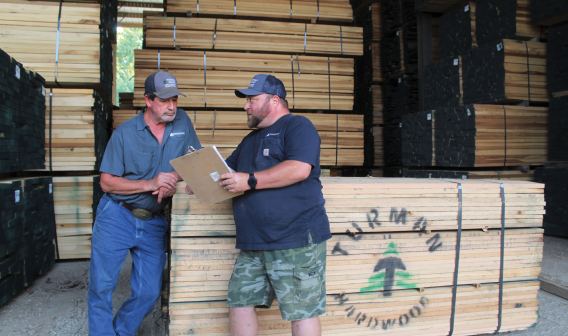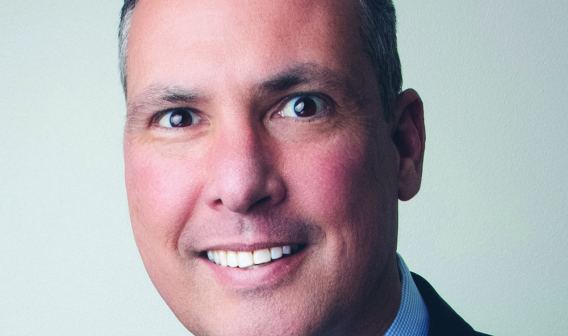The Future of Manufacturing in America
WestRock
WestRock is one of the world’s largest paper and packaging companies, with multiple locations in Virginia, including corporate offices in Richmond and manufacturing facilities in West Point and Covington. In September, the company announced a nearly $250-million investment in its manufacturing operations in the City of Covington and Alleghany County. These investments will be used to purchase new equipment to improve productivity at the paper mill and extruding facility, as well as to increase employee training.
Peter Durette is executive vice president of container and chief strategy officer at WestRock Company.
Virginia Economic Review: When you think about your industry specifically, what trends do you see now and think will develop over the next few years in the U.S.? How are things changing?
Pete Durette: WestRock is a packaging company, so we’re pretty focused within our upstream business on making substrate that goes into packaging. As you know, we have a number of paper mills in Virginia. But we also have roughly 30 total paper mills around the country and world, and then we have hundreds of converting locations. So, technology is impacting different parts of our manufacturing ecosystem in a different way. Digital transformation is an underlying theme we’re seeing. Our equipment produces billions of data points every day. So how we tap into all that data is a big part of what we’re doing to improve the way we manufacture, the reliability of our equipment, and the quality of our products.
We’re also seeing a need to continue automating more things within our factories. It’s very hard for us to find labor, skilled labor in particular. We need to automate some of those roles, particularly the ones that aren’t value-added, through robotics, conveyor systems, and automated shipping systems. Otherwise, we have trouble filling those roles in a consistent way.
We’re also seeing a move toward more late-stage product customization and more mass customization. Some of that is actually doing a package for each individual item, so an item can get a box built expressly for it every time, including right-sized, right protection, and even late-stage printing on it.
VER: With those trends in mind, what do you think are the things states and regions could do to better position themselves to attract new manufacturing investments in the future?
Durette: I always start with the basics. Particularly in our space, where we operate in a highly competitive and global marketplace, we need to operate in parts of the world that enable us to be as competitive as any other place. That means having access to really high-quality workers, folks who can do the job we need done, and also a thoughtful regulatory environment.
One of the great things about Virginia is that its mid-Atlantic location allows you to reach, from a shipping perspective, a big chunk of the United States in a day, as well as get to the port for export purposes. We export a lot of products, so having the right infrastructure from a transportation perspective; rail, road, and the port, is really important for companies like us that need to get their products to market.
VER: When you think about Virginia in particular, are there any other things you would mention that make it a compelling place for manufacturing?
Durette: The location is good. Because we have a lot of paper mills, having access to fiber is important. We’re in a great place in the state now. There have been a lot of thoughtful ways of encouraging us economically, and there’s a lot more fiber in the ground today than there was even 20 years ago. That’s been good for the environment in terms of how much CO2 it absorbs, but also for us because it’s a sustainable, renewable source of raw material for our facility.
You need the right skills in workers, you need reliable infrastructure, low-cost freight, and access to ports. You need a smart regulatory and tax environment. If you have those things, that’s the good foundation for business, in my view. Virginia benefits as an attractive place where people want to live. That matters, particularly for this next generation of workers. They want work-life balance.
VER: We hear a lot about the skills gap in the U.S., and it’s particularly acute in manufacturing. What do you think is driving that gap, and what could be done to close it?
Durette: I think we’ve got an education system that tends to put, from a higher-education perspective, most people through the four-year university system, often producing lots of grads who aren’t necessarily focused on the technical skills and capabilities we need. So we need a high school education system that isn’t geared to, “If you don’t go to four-year college, you’re lost,” but offers technical things you can learn at school, and then good community colleges that can skill folks up with the right capabilities to fit the jobs they want. And also, just letting people know that those are good jobs.
I look at a country like Germany and their whole apprenticeship program. They’re teaching the next generation those skills and capabilities in technical jobs you don’t need a four-year degree for. You need some advanced skills and a lot of on-the-job training.
We’re doing that in a number of our facilities with some success in different parts of the country, including here. I think there could be more done to prepare workers for these manufacturing jobs. Gearing the whole system from high school to junior college and community college in the right way can have a lot of benefit.





